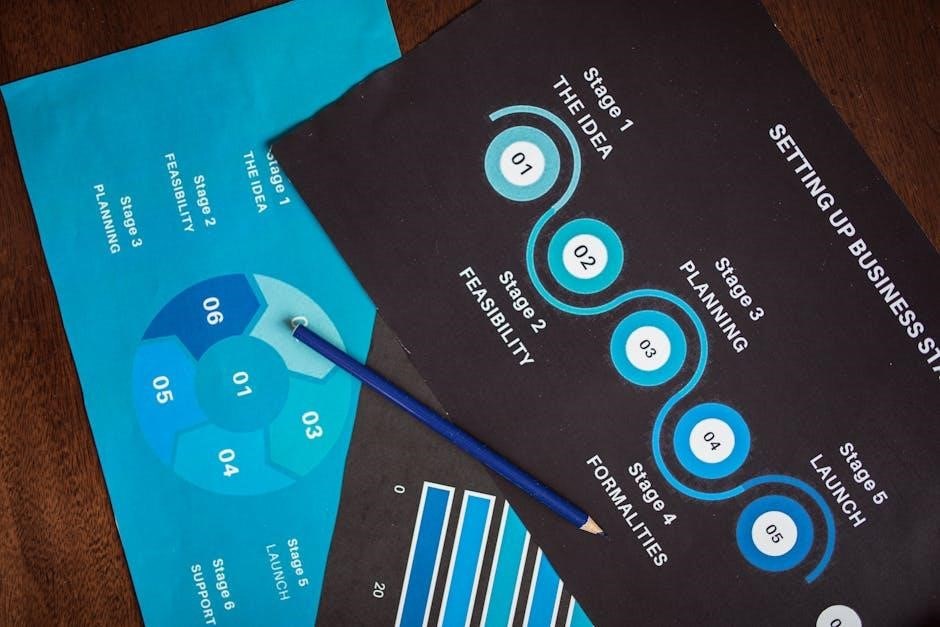Psychosocial stages of development involve personality growth through social interactions and experiences, shaping individual identity and character, as discussed in various online resources and pdf documents.
Definition and Overview
Psychosocial stages of development refer to the process by which individuals develop and mature through a series of social and emotional experiences. This concept is often discussed in pdf documents and online resources, providing a comprehensive understanding of human development. The stages are characterized by distinct social and emotional challenges, which individuals must navigate to achieve healthy development. A thorough understanding of these stages is essential for promoting positive growth and development. By examining the various stages, individuals can gain insight into their own development and identify areas for improvement. This knowledge can be applied in various settings, including education and personal relationships.

Longitudinal Studies and Adult Development
Longitudinal studies examine adult development over time, tracking psychosocial growth and changes, as discussed in various online pdf documents and research papers.
Research Findings
Research findings on psychosocial stages of development have been extensively documented in various pdf documents and online resources. Studies have shown that adult development is a complex and ongoing process, influenced by a range of factors, including social interactions, experiences, and personal relationships. According to researchers, longitudinal studies have provided valuable insights into the psychosocial growth and changes that occur over time, shedding light on the complexities of human development. These findings have significant implications for our understanding of adult development and the factors that shape individual identity and character, as discussed in various research papers and pdf documents available online.

Primary School and Industry vs Inferiority
Children develop industry and inferiority feelings during primary school years through social interactions and academic experiences online.
Challenges and Strategies
Children face challenges during primary school years, including developing industry and inferiority feelings, which can impact their self-esteem and confidence. Parents and educators can implement strategies to support children, such as providing positive feedback and encouragement, offering opportunities for socialization and skill-building, and fostering a growth mindset. By doing so, children can develop a sense of competence and self-worth, leading to healthy psychosocial development. Effective strategies can help children overcome challenges and achieve a positive sense of industry, setting them up for success in future stages of development and lifelong learning, as discussed in various online resources and pdf documents available.

Psychosocial Theory and Developmental Stages
Psychosocial theory explains human development through social interactions and experiences shaping identity and character gradually over time always.
Eight Developmental Stages
The eight developmental stages are trust vs mistrust, autonomy vs shame, initiative vs guilt, industry vs inferiority, identity vs role confusion, intimacy vs isolation, generativity vs stagnation, and integrity vs despair. Each stage presents a unique challenge that must be overcome for healthy development to occur. These stages are sequential and build upon one another, with the outcome of each stage influencing the next. Understanding these stages can provide valuable insight into human development and the factors that shape our personalities and characters. The stages are a fundamental component of psychosocial theory and are widely used in various fields, including psychology and education, to support human development.

Importance of Overcoming Challenges
Overcoming challenges fosters confidence and personality growth through successful experiences and relationships online.
Confidence and Personality Growth
Confidence and personality growth are essential aspects of psychosocial development, enabling individuals to navigate life’s challenges with resilience and adaptability, as discussed in various pdf resources. Through successful experiences and relationships, individuals can develop a strong sense of self and confidence, leading to healthy personality growth. This, in turn, fosters emotional intelligence, social skills, and a positive self-image, allowing individuals to form meaningful connections with others and achieve their goals. By overcoming challenges and developing confidence, individuals can cultivate a growth mindset, embracing opportunities for personal growth and development, and leading to a more fulfilling and purposeful life, according to online resources and research findings.
Eriksons Contribution to Psychosocial Development
Erikson expanded Freuds theory, introducing psychosocial development stages, greatly influencing psychology and human development studies, as seen in online pdf resources and documents.
Expansion of Freuds Theory
Erikson built upon Freuds psychosexual development theory, expanding it to include social influences and interactions. This expansion led to a more comprehensive understanding of human development, as outlined in various online resources and pdf documents. Eriksons theory introduced the concept of psychosocial stages, which emphasized the role of social relationships and experiences in shaping individual identity and character. By incorporating social dynamics, Erikson provided a more nuanced and detailed explanation of human development, moving beyond Freuds focus on sexual and aggressive drives. This expansion has had a lasting impact on the field of psychology and continues to influence research and studies today, including those published in pdf format online.
Relevance of Psychosocial Development
Psychosocial development is crucial for lifelong learning and social adaptation skills development always.
Impact on Lifespan Development
The psychosocial stages of development have a significant impact on lifespan development, influencing an individual’s ability to form and maintain relationships, cope with stress, and adapt to change. According to various studies, successful navigation of these stages can lead to increased emotional intelligence, resilience, and overall well-being. Conversely, unresolved conflicts or unmet needs during these stages can result in negative outcomes, such as decreased self-esteem, anxiety, or depression. Understanding the impact of psychosocial development on lifespan development can inform strategies for promoting healthy growth and development across the lifespan, as discussed in various online resources and pdf documents available.
Supporting Childrens Development
Parents and educators play crucial roles in supporting childrens development through guidance and encouragement always matters greatly online.
Role of Parents and Educators
Parents and educators have a significant impact on childrens psychosocial development, providing guidance and support to help them navigate various stages. They can foster a sense of competence and self-confidence by encouraging children to take on new challenges and praising their efforts. A nurturing environment can also help children develop emotional intelligence and social skills, essential for building strong relationships. By being role models and providing positive reinforcement, parents and educators can play a crucial role in shaping childrens identity and character, ultimately influencing their overall development and well-being, as discussed in various online resources and pdf documents available today.
and Future Directions
Understanding psychosocial stages is essential for personal growth and development, guiding future research and applications in various fields and online pdf resources.
Implications for Lifespan Development
The study of psychosocial stages has significant implications for lifespan development, as it provides a framework for understanding human growth and development across the entire lifespan. This knowledge can be used to inform strategies for promoting healthy development and preventing developmental delays or disorders. By understanding the psychosocial stages, individuals can better navigate the challenges of each stage and develop the skills and abilities necessary for successful adaptation to changing life circumstances. Additionally, this knowledge can be applied in various settings, such as education and healthcare, to support the development of individuals across the lifespan, as discussed in various online pdf resources and documents.